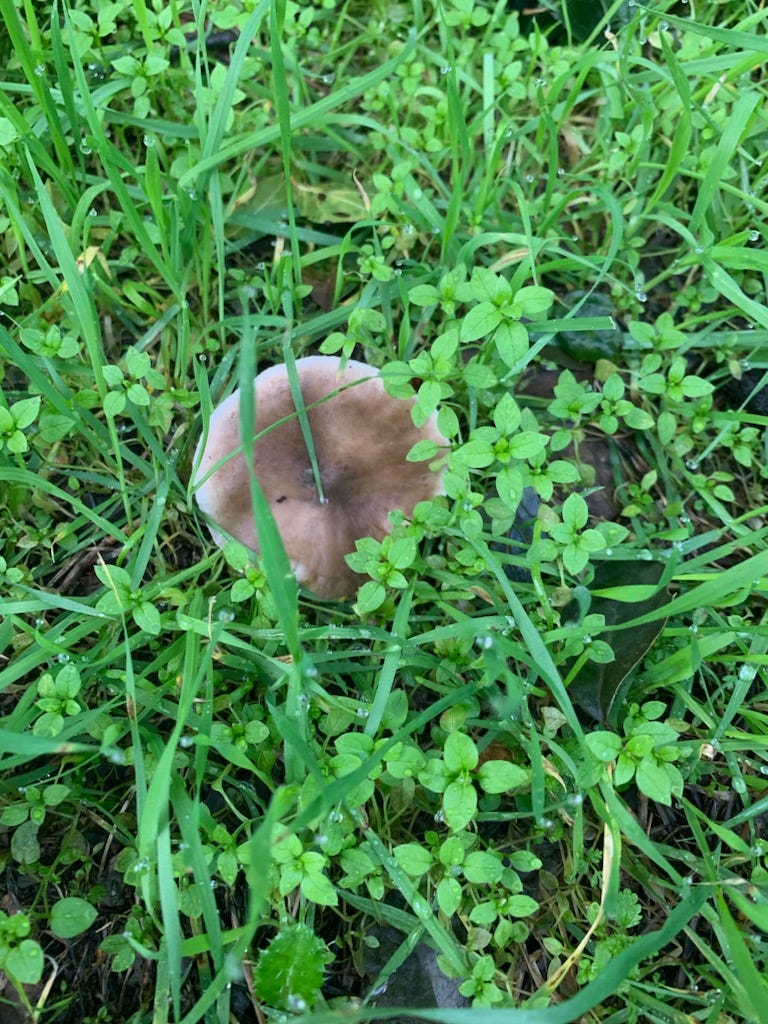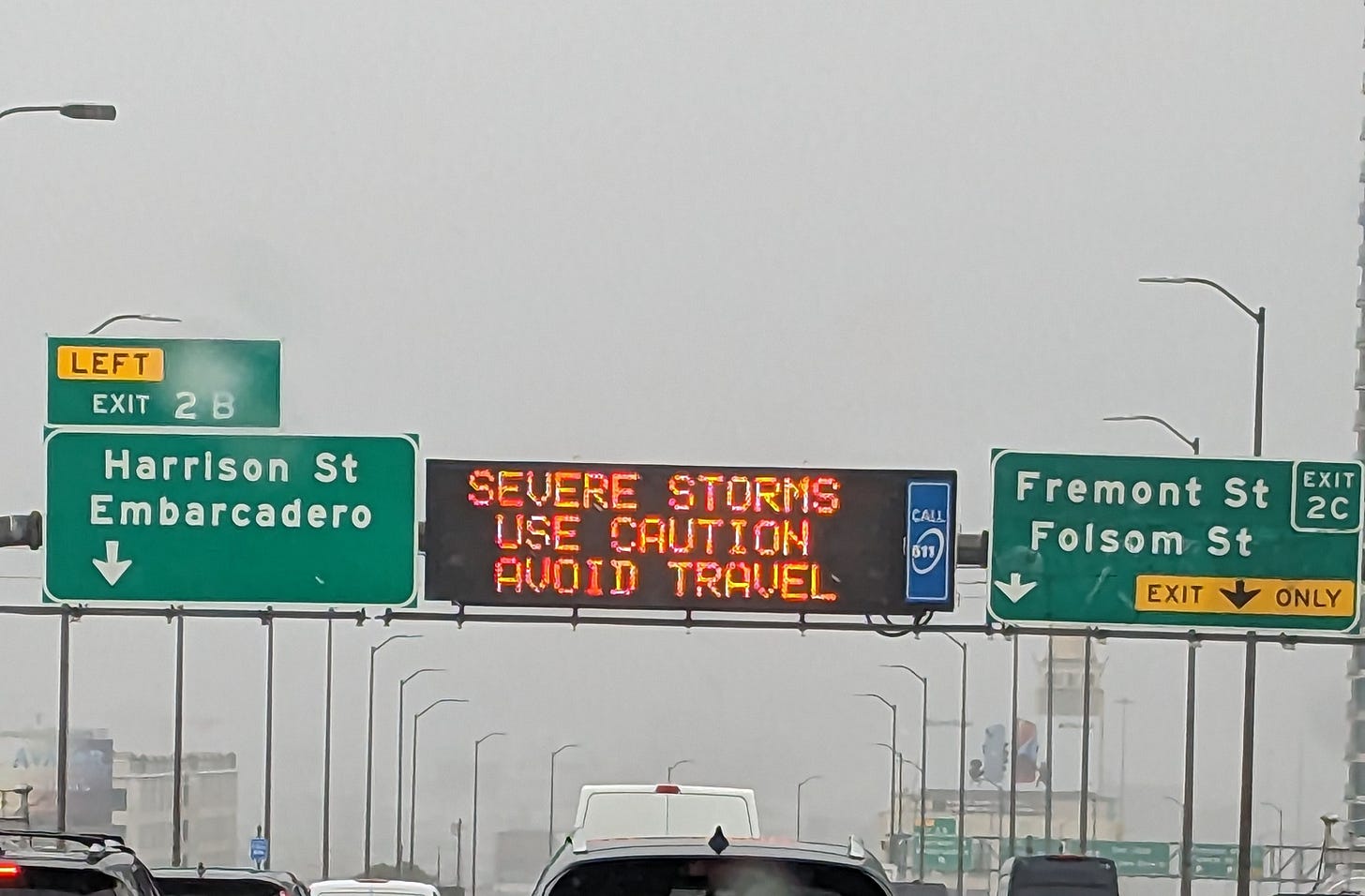Urayoán Noel’s poem “cinquains written during a tropical storm” begins with the opening stanza:
to live / now is to speak / the language of the tree / toppled along the expressway / at night
A cinquain is a poetic form that has five lines with two, four, six, eight and two syllables in each successive line. Living through climate collapse distorts the five senses: sight, smell, sound, taste and touch. Our language continues to change, our familiarity with our landscape continues to shift (I’ve always considered cities disorienting), our instincts shift. Our bodies are the most honest source of knowledge we know, and when that knowledge is disrupted, it becomes easier for influence.
More and more these days I feel aligned with the tree, toppled along the expressway, the very organic matter that reminds me of my own fallibility in an increasingly built world. During our New Year’s Vacation, a huge winter storm hit eastern California and parts of Nevada. We were driving back from Toiyabe National Forest, watching the snow melt to rain puddles, passing collapsed tree after collapsed tree. After the worst of the rainstorms were over, 17 deaths were reported throughout the state of California. We have another week of intense rain to withstand.
The concept of an atmospheric river is relatively recent; in 1990 researchers Reginald Newell and Yong Zhu coined the term to reflect the narrowness of the moisture veins that caused the phenomenon. Atmospheric rivers have been increasing in intensity in the state of California due to climate change; drought and flooding are related. This is an important connection to make with climate change: when one extreme burdens an area, the opposite extreme isn’t too far behind.
Now, some people say this rain answered our prayers. Others are taking it as proof that “global warming” is now a non issue – the climate has self-regulated and readjusted. And while it’s cool to take my daily little depression walks and see new mushrooms popping up all over the place, it’s also worrying how increasingly normalized extreme weather events are becoming. When a drought has been ongoing for so long, an intense rainstorm doesn’t simply alleviate that drought. It brings a slew of whole other infrastructural and landscape related problems. If the soil is too dry to soak up the precipitation, where does all that excess water go?
Every so often my Denver “superiority complex” pops up; when I am hiking with a group and am the last to run out of breath (5280 mile high baby), when I see how much California weed costs, when I am tasked with commuting in less than ideal weather conditions. As I cross the Bay Bridge into work, a large sign with neon yellow letters reads “SEVERE STORMS USE CAUTION AVOID TRAVEL.” It is 11:30 am on a Wednesday and I am stuck in some of the worst traffic I have ever been in.
Nothing will make you a staunch supporter of expanded, green public transit than having to navigate SF to East Bay Traffic during a severe rain and wind storm. Even then, you start to wonder why people are forced to come into work during a bomb cyclone in the first place. You wonder why students, many of whom were without power during the worst of the storm, are forced to come into school. You wonder why there is a lack of storm drains in predominantly Black and brown neighborhoods in the Bay Area. You wonder what protections are in place for homeless folks who are increasingly vulnerable to climate change and the tensions that rise in the aftermath of an extreme weather event. As you sit in your car, in bumper to bumper traffic, listening to the humming drone bouncing inside your own skull, you think about how it’s going to get even worse. You wonder why we can’t all just take a breath for a few moments and figure out what the hell is going on.
Natural selection, as taught to us in grade school, is an evolutionary process where organisms that have adaptable traits are more likely to survive and reproduce in an environment than those that are less adapted to that environment. These adaptable traits are then passed down and become more common in a population over time. Now, this may be applicable for birds and trees and frogs, but for humans it's a little more complicated. Unfortunately, our socially darwinistic society doesn’t really give two shits about that: it’s about who can outcompete who. Sometimes it’s just plain luck. Too often it’s purposeful neglect rooted in apathy, eugenics and sacrifice zones. A homeless encampment sweep is set to happen just days after a flood. Cruelty is the point.
For those of us who survived the storm, our reward is showing up and doing it all over again. Survival of the fittest baby. Because we are still in a pandemic, attempting to keep it all together under the weight of inflation, climate change, and intense, ongoing grief, a lot of people have just gone numb to it. Death surrounds us, and we lone survivors are barreling through until we can’t anymore – this is the dogma of capitalism. For those who are still clinging to hope that our governments will respond differently to climate collapse: look at what is currently happening with the pandemic: “new normal.” Matta’ fact, look around you: multiple crashes on the I-80 and I-580 because people are normalizing unnecessary risk. Insurance rates through the roof. A general mood of apathy and distrust. And when was the last time you bought eggs and it didn’t break your heart (and your wallet)?
Life is chaos: things happen, grief persists, joy comes in the morning. We make new discoveries as much as new heartbreaks, we invent new ways of relating, new ways of getting over. But normalized chaos is a dangerous game: many of the things we accept in society (cars, fossil fuel dependency, oligarchies, food inequity, wealth gaps) are not simply luck of the draw but maintained strife. Unnatural selection.
In an essay for Sierra entitled “A Playlist for the End of the World” as I was grappling with the overlaps between mass species extinction and COVID-19 deaths, I wrote:
“Everything was meant to be temporary, and so we exploited that temporality to suit our own agendas. Survival of the fittest, right?”
Adaptability doesn’t have to be painful. It doesn’t have to be luck of the draw, it doesn’t have to be state sanctioned. Yesterday, I saw a tweet that read “climate activists, in the future we will not regret doing too much climate activism, but too little. We will not regret taking too many risks, but too few…” How are we going to adapt to our new living conditions? Are we going to keep playing roulette with our lives and with the lives of our community members, or are we going to figure out how to withstand the storm collectively?
~ griot
Forthcoming: Rewilding & Writing Nature Poetry Class with Blue Stoop, every Tuesday from March 7th through 28th at 3 pm PST. Financial Aid AVAILABLE! https://www.bluestoop.org/classes/ashia-ajani-writing-nature-poetry






